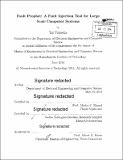Fault prophet : a fault injection tool for large scale computer systems
Author(s)
Tchwella, Tal
DownloadFull printable version (5.401Mb)
Alternative title
Fault injection tool for large scale computer systems
Other Contributors
Massachusetts Institute of Technology. Department of Electrical Engineering and Computer Science.
Advisor
Martin C. Rinard and Stelios Sidiroglou-Douskos.
Terms of use
Metadata
Show full item recordAbstract
In this thesis, I designed and implemented a fault injection tool, to study the impact of soft errors for large scale systems. Fault injection is used as a mechanism to simulate soft errors, measure the output variability and provide analysis of the impact of soft errors on the program. The underlying framework for the tool is based on LLFI, a LLVM fault injection tool, which I modified to support an end-to-end scenario for program testing purposes. The modifications and addition provide greater modularity of the tool by abstracting the input and output of the different components of the tool, support multiple fault scenarios and models, and supply an extensive visualizations framework. I evaluated the effectiveness of the new tool based on a set of benchmark programs as well as showcased the impact of soft errors on programs. The results demonstrate that while the sensitivity of instructions is program dependent, certain instruction opcodes are generally more sensitive than others, such as binary and memory operations, however well placed protection mechanisms can decrease the sensitivity of those instructions.
Description
Thesis: M. Eng., Massachusetts Institute of Technology, Department of Electrical Engineering and Computer Science, 2014. Cataloged from PDF version of thesis. Includes bibliographical references (pages 107-109).
Date issued
2014Department
Massachusetts Institute of Technology. Department of Electrical Engineering and Computer SciencePublisher
Massachusetts Institute of Technology
Keywords
Electrical Engineering and Computer Science.